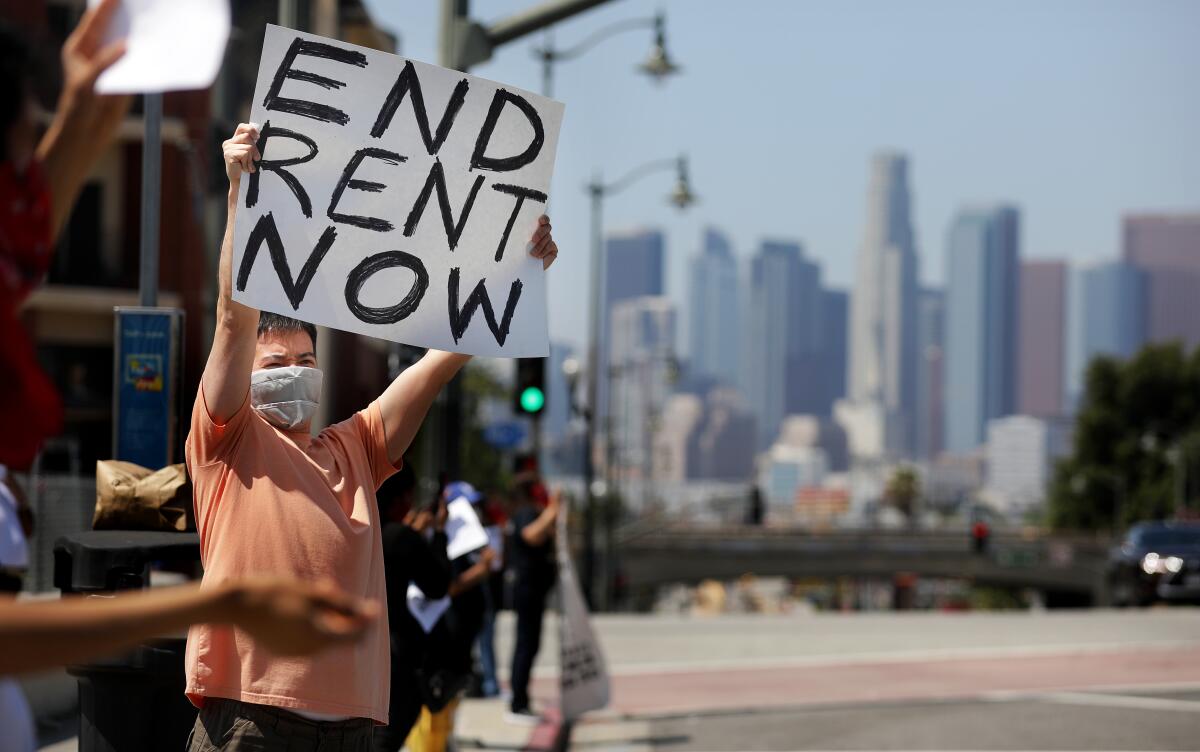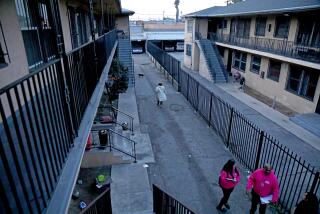Editorial: Tenants need a rent bailout. Right now

The head of the Centers for Disease Control and Prevention recently made a dire prediction: As many as 450,000 Americans could die from COVID-19 by the end of February, and this winter could be the most challenging moment for public health in the history of the country.
Yet even as we prepare for a long, hard winter, the eviction moratoriums that have kept struggling workers and families housed during the pandemic will soon begin to expire.
If lawmakers across the country allow those protections to disappear, we could see a crushing wave of evictions — as many as 40 million people are at risk, according to one study — that would devastate tenants and landlords, lead to mass displacement and homelessness, hasten the spread of the coronavirus and deepen the pandemic recession.
However, with swift, thoughtful action — and a major infusion of relief dollars — lawmakers could prevent this social and economic devastation. The choice should be clear.
First, President Trump should extend the sweeping national prohibition on evictions issued by the CDC, which is set to expire on Dec. 31. The public health order rightly recognized that we can’t slow the spread of COVID-19 unless people have a home in which to quarantine, isolate and socially distance. It would be counterproductive to controlling the pandemic and, possibly, deadly to let renters be forced into homelessness.
Simply extending the moratorium is not enough. Tenants, who have lost income through no fault of their own, are racking up rent debt that will come due when the moratorium lifts. The Federal Reserve Bank of Philadelphia estimated that households will owe $7.2 billion in rent by the end of the year, averaging around $5,400 each.
Plus, it’s unfair to force some property owners to go without rent payments for nine months or longer. Nearly three-quarters of apartment properties in the U.S. are owned by individuals, not corporations or investor groups, and most apartment buildings have only a handful of units. While some landlords have gotten mortgage payments deferred, they still have other expenses, including utilities, taxes and maintenance.
Congress and Trump should have enacted rent relief months ago. House Democrats passed a $3-trillion coronavirus relief bill in May, which included a $100-billion emergency rental assistance fund for low-income tenants. That went nowhere with Senate Republicans and the Trump administration. But now a last-ditch bipartisan Senate proposal has called for $25 billion in rental assistance. This is not the time to pinch pennies; Congress and the president have to spend now to prevent a tsunami of evictions and landlord defaults.
Federal lawmakers can make the biggest impact, but there’s still a lot that California and local leaders can do to avoid greater suffering.
Gov. Gavin Newsom and the Legislature have a surprise $26-billion budget surplus. This is a one-time windfall; they should use much of the money to prevent a once-in-a-lifetime pandemic housing crisis. California’s moratorium is set to end on Jan. 31, and tenants will have to pay at least 25% of their rent from September through January, or face eviction.
The remaining rent will be converted into consumer debt. Landlords can’t evict for the unpaid rent, but they can sue and possibly garnish tenants’ wages. It’s hard to imagine how tenants, many of whom were paying half their income on rent before the pandemic, will be able to come up with the money. Rather than allow pandemic debt to be a lasting burden on tenants and landlords, the state could create a relief program, offering cash or tax credits to property owners willing to forgive their tenants’ rent debt.
In Los Angeles, there’s a push for city and county leaders to suspend rent debt during the emergency and create a hardship fund for small landlords. There should be even greater urgency in L.A. to come up with a plan for comprehensive renter and landlord relief. This is a region that had crushing poverty and a staggering homeless and affordable-housing crisis before the pandemic. The fear of racking up rent debt is forcing people to take out payday loans, borrow on their credit cards and work even when they should be quarantining or sheltering at home.
Political leaders tend to wait until the crisis is imminent before they act. But it’s cruel and counterproductive to keep extending eviction moratoriums without addressing the inevitable rent due date. We know what lies on the other end of this long, hard winter. Lawmakers should act now to make sure rent debt doesn’t crush tenants and landlords.
More to Read
A cure for the common opinion
Get thought-provoking perspectives with our weekly newsletter.
You may occasionally receive promotional content from the Los Angeles Times.






